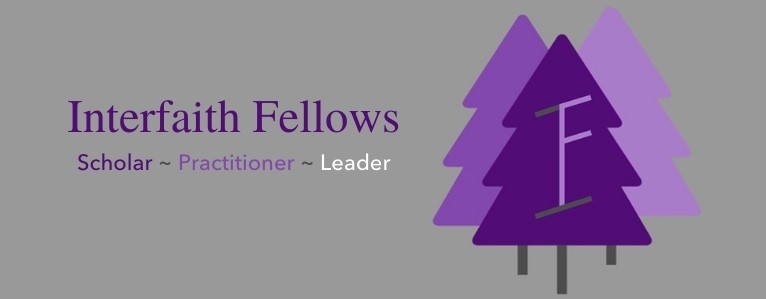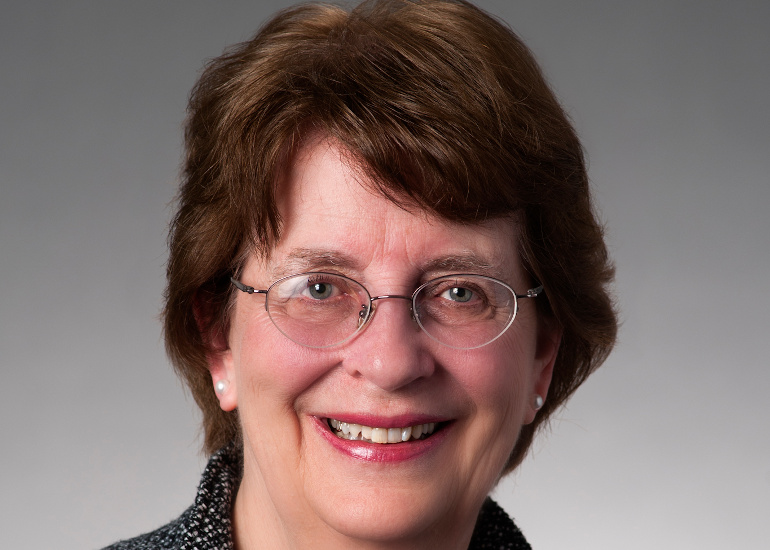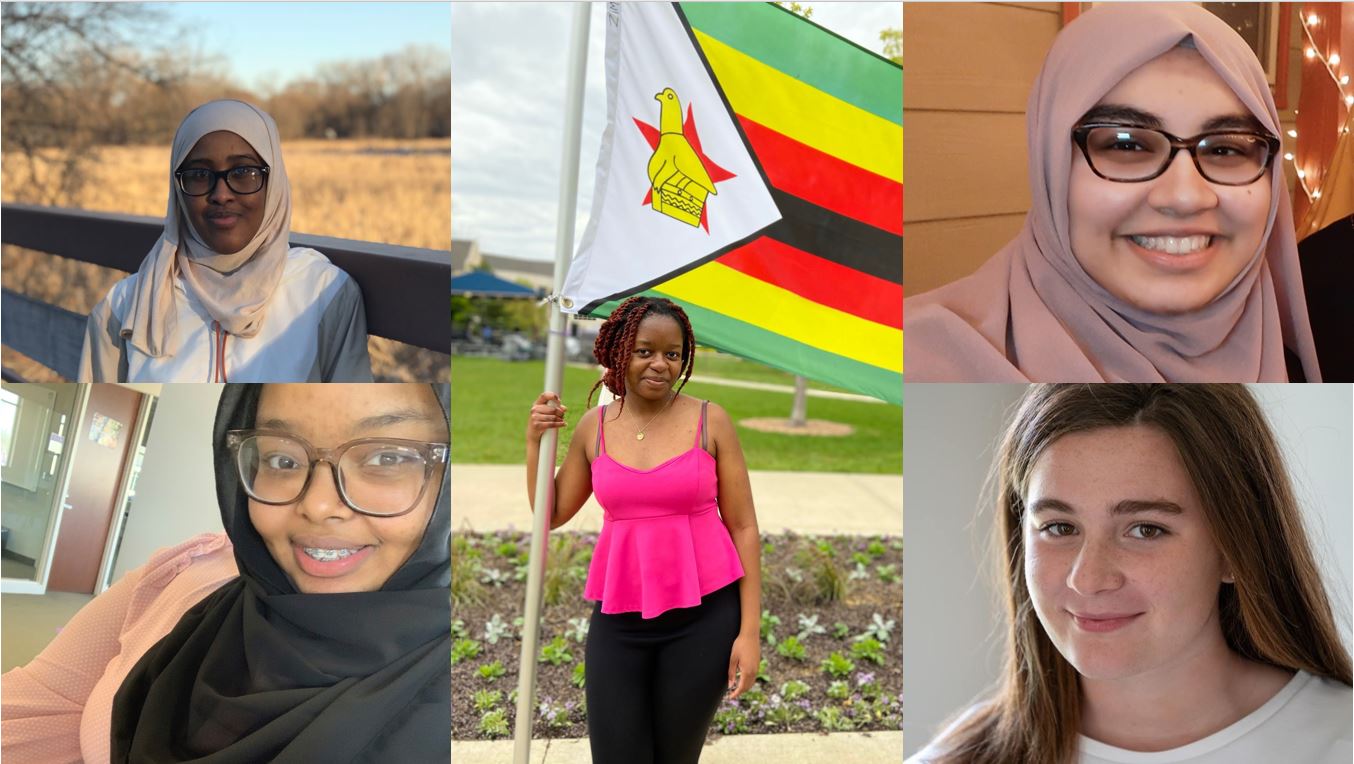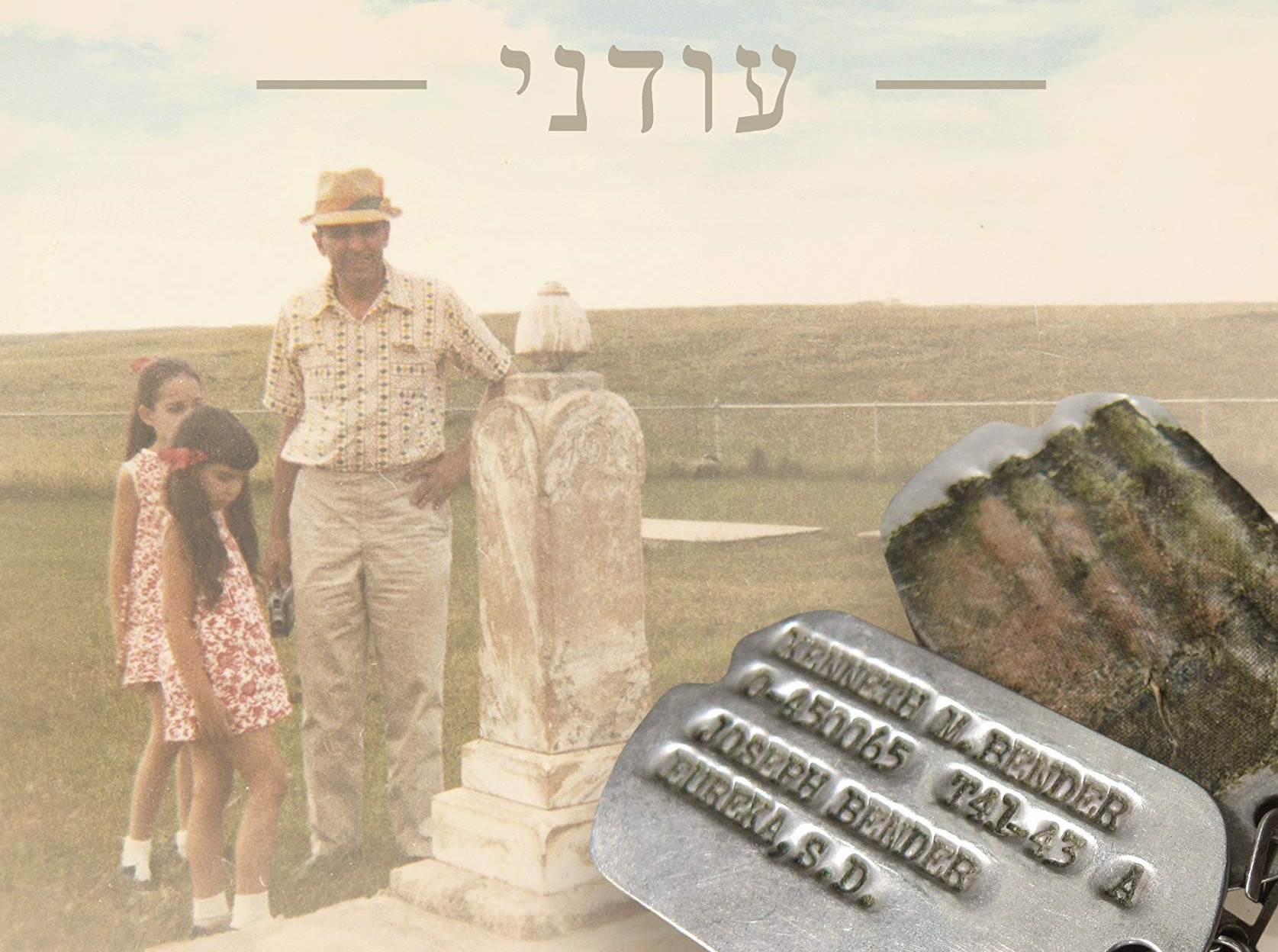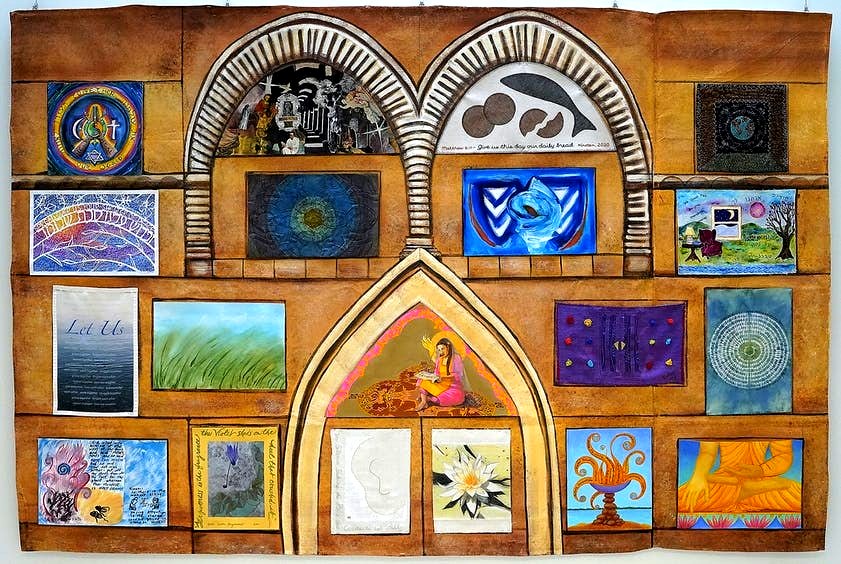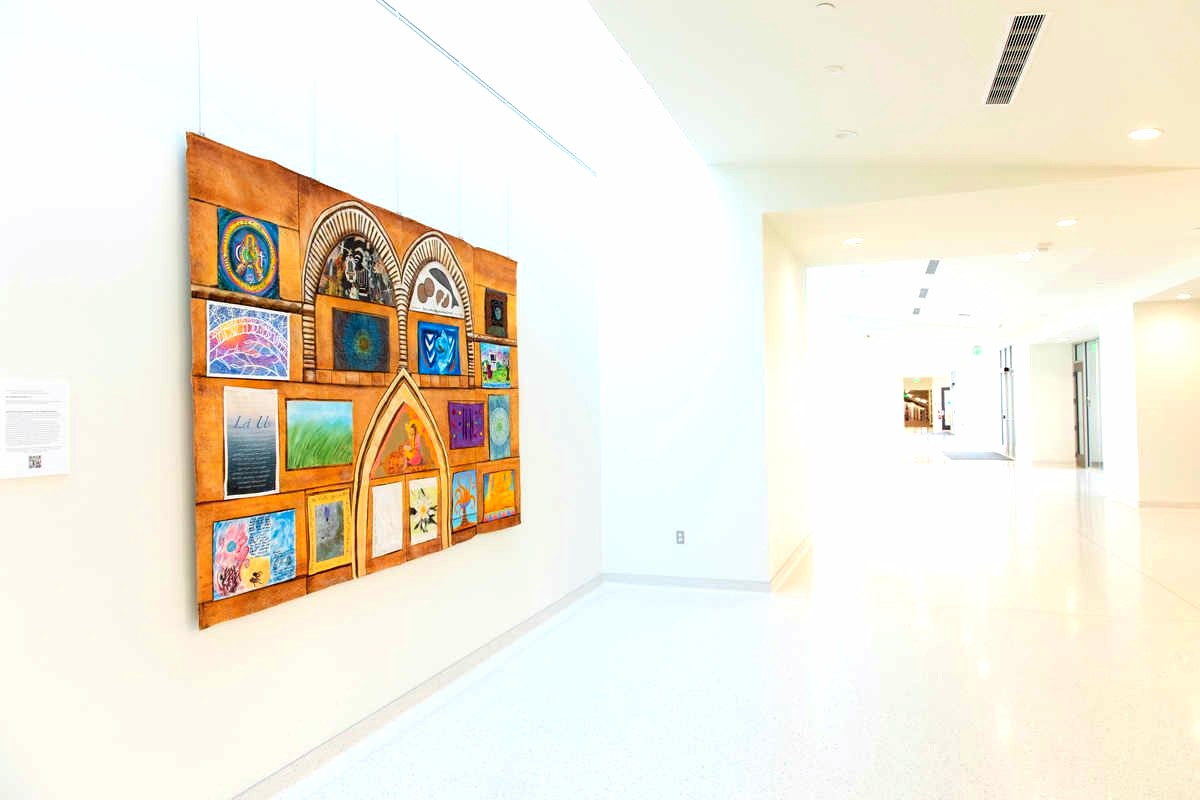With funding from the Arthur Vining Davis Foundations, we launched the Interfaith Fellows Program, a student-centered two-year experience designed to prepare (inter)religiously literate and responsible scholar-practitioner leaders, critically informed by how lived religious practices and beliefs shape America, who act wisely, work skillfully, and engage religious diversity to advance the common good in civic, academic, professional, nonprofit, public, and community sectors. The inaugural cohort of seven fellows worked towards earning a minor in Interfaith Leadership, met with accomplished scholars and leaders (Busshō Lahn, Rev. Jim Bear Jacobs, Chris Stedman, Dr. Barbara McGraw, and Dr. Anastasia Young), began interfaith engagement practicums with community partners (including Sadhana, Minnesota Multifaith Network, Sakan Community Resource, Aslan Institute, Minnesota Interfaith Power & Light, and the Kaleo Center), engaged in international dialogue through Soliya Global Connect, took on campus leadership roles (including the Interfaith Council, Muslim Student Association, and Student Diversity and Inclusion Services), and completed research (e.g., quantitative survey measuring the influence of religion on decision making in relationships). We look forward to welcoming the second cohort this coming fall, and collaborating with the Minnesota Multifaith Network to host a multifaith leadership conference in Spring 2023.
As members of Minnesota’s diverse religious communities, we stand together in strong condemnation of the recent attack on the Muslim Al Maghfirah (MAG-FIRAH) Cemetery in Castle Rock Township (watch news conference at https://fb.watch/8TRU5PrVy-/).
This is not the first incident of such attacks. We join our voices to speak against the desecration of a cemetery of our Muslim sisters and brothers in Minnesota. These threats of violence to a sacred place of burial are deplorable. Such threats are intended to arouse fear and to violate religious feelings. We refuse to be intimidated and to succumb to fear. We stand side-by-side with the Muslim community in courageous resistance to such unacceptable and shameful acts.
We are committed to the ongoing work of building inclusive communities in Minnesota where members of all religious traditions feel safe and supported in their places of worship, and in public spaces, to affirm their religious identities and to practice their faiths without fear. Our freedom to profess and practice our faiths without fear is fundamental to our human rights. Threats and acts of violence against any faith are a threat to us all. We stand in solidarity with, and extend our support to, our Muslim neighbors in resisting intimidation and fear.
Co-signed by:
- Vishal Agarwal, Member of Trustee Executive Council, Hindu Society of Minnesota
- Pooja Bastodkar, President of Hindu Society of Minnesota
- Lee Blons, CEO/President, Beacon Interfaith Housing Collaborative
- Lee Burdge, The Church of Jesus Christ of Latter-day Saints
- Becca Buse, Interfaith Leader, Interfaith Youth Core Alumni
- Zan Christ, Multifaith Practitioner and Public Speaker
- Rabbi Norman M. Cohen, Founding Rabbi Emeritus, Bet Shalom Congregation
- Rev. Richard H. Coleman, Wayman African Methodist Episcopal Church
- Rev. Ben Connelly, Minnesota Zen Meditation Center
- Genjo Conway, Mirror Lake Temple
- Charles Curry, Evangelist, Community of Christ
- Curtiss DeYoung, Minnesota Council of Churches
- Tom Duke, Lutheran pastor (ret.)
- John Emery, Executive Director, Islamic Resource Group
- Sosan Theresa Flynn, Guiding Teacher, Clouds in Water Zen Center, St. Paul
- Ram Gada, Founding Member and Past President of the Jain Center of Minnesota
- Hans Gustafson, Ph.D., Director, Jay Phillips Center for Interreligious Studies, University of St. Thomas
- Rev. K.P. Hong, Minister at Unity Church-Unitarian
- Patrice Clark Koelsch, Buddhist Chaplain, Common Ground Community Member
- Bill Konrardy, Anti-racist, United Methodist Church
- Rev. John Matthews, ELCA Clergy and Adjunct Instructor, Augsburg University, Minneapolis
- Shehla Mushtaq, Interfaith Circle
- Julia Nerbonne, Minnesota Interfaith Power & Light
- Joy Persall, Ojibwe Metis
- Mary Pickard, Unitarian Universalist
- Anantanand Rambachan, Emeritus Professor of Religion, Saint Olaf College
- Bradley E. Schmeling, Senior Pastor, Gloria Dei Lutheran Church, St. Paul
- Zafar Siddiqui, Board Chair, Al-Amal School
- Rabbi Adam Stock Spilker, Mount Zion Temple, St. Paul
- Prabhat Tekriwal, Hindu Leader
- Rev. Dr. Trish Sullivan Vanni, Pastoral Director, Charis Ecumenical Catholic Community, Eden Prairie
————————————————————————
Minnesota Multifaith Network (MnMN) helps facilitate cooperative efforts like the statement above. Resources like this are shared by MnMN in the spirit of collaborative learning and sharing and not as an endorsement or sponsorship of any particular organization or position. Originally posted here: https://mnmultifaith.org/interreligious-statement-of-solidarity-with-the-muslim-community-of-minnesota/
Lois Dament, esteemed administrative coordinator for the Jay Phillips Center in the College of Arts and Sciences at the University of St. Thomas, retired this fall after 37 years of service to the university.
Dament joined St. Thomas in 1984 and has since flourished in a variety of academic and administrative roles. She started in the Social Sciences Division (then economics, sociology, history, political science) and concurrently in the English Department, earning a B.A. and M.A. in English and receiving the Joseph Connors Award for academic excellence, and raising five children in the process. Professor Anne Klejment recalls,
From the start, Lois served as one of two admins for the Social Science Division and English Dept in the era of typewriters, word processors, mimeograph machines, and hand -written phone messages! We all were crowded into the 4th floor of OEC. Lois and another admin were crammed into a tiny “fish-bowl” office. Smart and funny, she mastered new devices and procedures quickly and thoroughly and efficiently serviced faculty needs. No matter which position she held, Lois has always been a trusted and most knowledgeable “go-to” person on campus. She was a UST Loaves and Fishes volunteer at Faith Lutheran in Frogtown. She usually was one who cooked some of the 50lbs of ground beef that we used to make tater tot hot dish! She was also completing her undergrad degree in English at the same time–and was one of my students in the History of Women in the United States. She was an outstanding student, and is is very, very bright!!!” And, for me, she is a cherished friend. — Anne Klejment
Lois then served the Graduate School of Social Work in 1989, transferred to the Registrar’s Office in 1990-93, before a decade (1993-2003) in the New College (which subsequently became the School of Continuing Studies – SCS). Gene Scapanski, Dean of SCS, adds,
Congratulations to Lois on her retirement! I had the privilege of working with her for five years starting in 1998 at the School of Continuing Studies. Her love of St. Thomas and her dedication to our adult students was exemplary. She understood their goals and struggles because she, herself, was a life-long learner, getting her bachelor and master degrees while working and raising a family. She has lived the mission of St. Thomas and contributed to it so effectively in multiple ways. I know she will be missed! –Gene Scapanski, S.T.D.
In 2007, Lois transferred to the College of Arts and Sciences (CAS) where her talents were impressively utilized to serve several departments, offices and programs. These included the CAS Deans Office, Communication Studies (later Communication and Journalism), Theater, Muslim-Christian Dialogue Center (MCDC), Health and Exercise Science, American Culture and Difference, Justice and Peace Studies, the Undergraduate Communication Research Conference, and the Jay Phillips Center for Interfaith Learning (JPC). Terry Langan, former CAS Dean and Professor of Economics, remembers Lois,
First when I was an adjunct faculty member teaching in the economics department and eventually during my time as academic dean, we have had many conversations over the years. In all of that time, I never once heard Lois say, “I can’t do that.” She was more likely to say, “Well, I have never done that before, but I will figure it out.” Lois is a problem solver who figured things out for many different people during her 37 years at St. Thomas. On behalf of those many people, I would like to thank Lois for her excellent work. — Terry Langan
Combining a broad range of management skills, rich university experience and wisdom, and a deep-seated interest in interfaith and intercultural relationship building, Lois brought fresh knowledge and perspectives to colleagues, students, and community members through her various roles on campus. Dr. John Merkle, former director of Jay Phillips Center for Interfaith Learning at St. Thomas, praises Lois,
During my time as director of the Jay Phillips Center, it was always an honor and a joy for me to work with Lois Dament. In my early years as director, Lois helped me establish many contacts at St. Thomas that made my work with the center more collaborative and effective. And I was always particularly grateful that Lois helped plan and host the center’s main events, making sure that guests felt welcome and that events ran smoothly. I could not have been more pleased with the work Lois performed for the Jay Phillips Center, and I am happy to extend my congratulations to her upon completing an outstanding career of service to St. Thomas. — John Merkle
Hans Gustafson, director of the Jay Phillips Center, remembers his “first day of employment at St. Thomas and visiting Lois’ office. We chatted for about two two hours as she showed me the ropes. Lois also introduced me to her family and rich history here at St. Thomas. That day I realized how lucky I was to be working alongside someone as warm, caring, and knowledgeable as Lois. It is no wonder she flourished in her role with the Jay Phillips Center and the Muslim-Christian Dialogue Center, for she truly put a human face on the centers’ aim to manifest interfaith hospitality toward students, staff, faculty, and community members.”
Lois will miss her work with the JPC and MCDC, especially the opportunities to help host a variety of speakers from around the country and plan diverse events that focused on intercultural and interreligious learning. However, she looks forward to having a little more time to spend with her husband Jim as well as her children and grandchildren.
Arthur Vining Davis Foundations Funds St. Thomas’ Inaugural Student Interfaith Fellowships
Diverse faith perspectives inform the way people live, work and play together. This reality inspired St. Thomas’ inaugural Interfaith Fellows Program, which was recently awarded a prestigious national grant through the Interfaith Leadership and Religious Literacy Program of the Arthur Vining Davis Foundations.
Launching in fall 2021, the program is designed to educate and prepare interreligiously literate leaders who are informed by how lived religious practices and beliefs shape America and who engage religious diversity in service of the common good wherever their personal or professional lives lead.
“This program is really about developing the skill sets and competencies in student Interfaith Fellows to not only personally thrive and flourish, but also to lead in these spaces,” said Hans Gustafson, PhD, director of the Jay Phillips Center for Interreligious Studies and the Interfaith Fellows Program.
Funded by a $100,000 grant from the Arthur Vining Davis Foundations, the program will offer opportunities for approximately 15 student fellows over the course of the four-year pilot.
Seven St. Thomas students have been accepted into the first cohort, receiving a $2,000 stipend, funded by the grant and the Jay Phillips Center, to support their work. The recipients are second and third-year students: Consuela Collaso, Isha Gadkari, Mumtas Mohamed, Khanyilanga Ndlovu, Aiesha Osman, Delaney Sacia and Lily Stringer.
Customized learning
Over the course of two years, the fellows will complete coursework in the new theology minor in interfaith leadership, complete an internship with a community partner that engages religious diversity, and put their leadership skills into practice on campus and in the community.
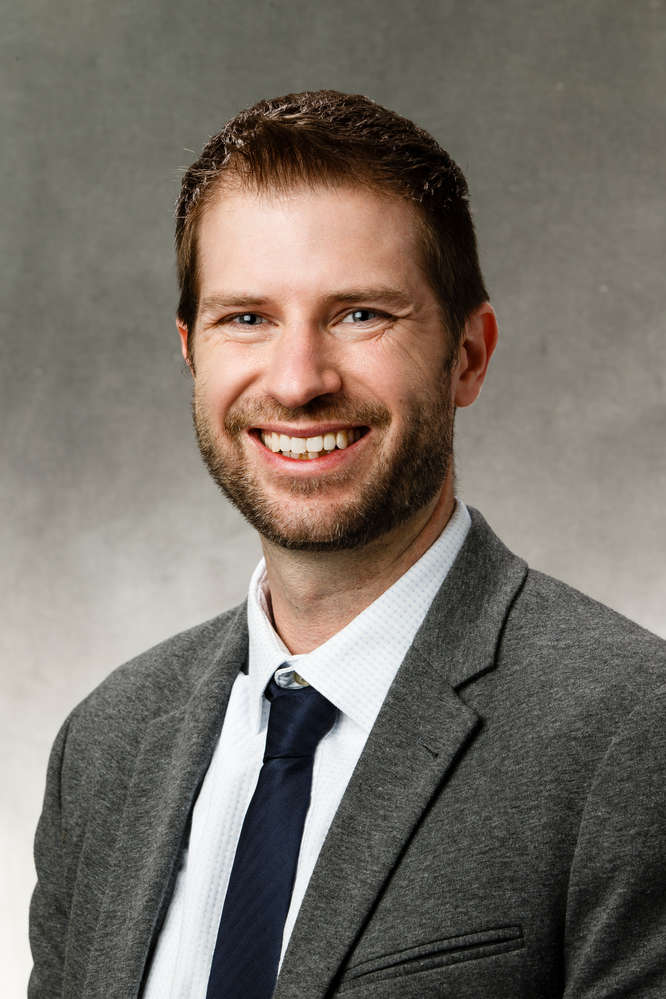
Gustafson said the program follows a scholar-practitioner-leader model and the students are meant to customize the experience to their unique interests. The fellows in this first cohort represent a wide spectrum of personal and professional interests, including political, neuro and environmental sciences, economics, international studies and biology.
“If the students are interested in the health professions or the legal profession, etc., we can match them with opportunities to learn about religion in those spaces, so they get a sense of how religious and worldview diversity shapes those industries and plays a role in the professional duties of those in them,” Gustafson said.
Khanyilanga Ndlovu ’23 earned a spot in the fall 2021 cohort. A psychology and family studies double major, Ndlovu said she plans to pursue a master’s degree in clinical psychology or marriage and family therapy and sees understanding faiths as an important part of her goal to increase access to holistic health and ultimately, of her work to help people heal.
“It feels right to take the step to educate myself about different faiths and religions for my own pursuit of truth and to better serve those around me with diverse beliefs and convictions,” Ndlovu said. “Holistic health involves looking at the whole person – their physical well-being, psychological and mental, spiritual, environmental well-being and more – all in the effort of helping them heal themselves.”
Engaging religious diversity in the real world
The program’s focus beyond the academic aspects of interfaith learning is intentional, Gustafson said.
Seventy percent of Americans indicate their workplace as the top location for the most frequent interaction with people who do not share their religion, according to research from Public Religion Research Institute, a nonprofit, nonpartisan think tank focusing on research at the intersection of religion, culture and politics.
While students graduate with knowledge in their industries, they may lack the skills to engage with and understand religious or culture perspectives other than their own. Fellows will gain firsthand knowledge of the very real tensions and issues surrounding interreligious relations in Minnesota and on campus, Gustafson said.
“The program includes theoretical scholarship, but it also emphasizes practice,” Gustafson said. “The fellows will have opportunities to get off campus to engage some of this stuff and then lead. The program has significant components of leadership and professional development around which fellows can customize to meet their goals.”
Part of where that practice happens is through community engagement. Each student will spend 100 hours practicing their skills with a community partner they choose with help from St. Thomas’ Center for the Common Good. Gustafson said each fellow shares an interest in service to community.
“Students at St. Thomas tend to be very open to doing community engagement, to getting out into the community, engaging local organizations, local residents, doing hands-on experiences outside of the classroom,” Gustafson said. “I’m deeply impressed by that, and this Interfaith Fellows Program appeals to that desire, that culture we have here at St. Thomas of doing community engagement in our region.”
Partnering with a community organization that aligns with their professional goals, students may work on a fundraising or marketing campaign, logistics planning, communications, technology, storytelling or other work which engages religious diversity.
“Fellows will have opportunities to put into practice the skills they’ve learned through the program’s various components, but also will be invited to just go out and engage religious diversity in the community under the mentorship of professionals who already do it day in and day out,” Gustafson said.
Whether it’s end-of-life care or beliefs about the environment or politics, interfaith leadership and education can transform interactions in many of the spaces students will eventually work, live and play.
The Arthur Vining Davis Foundations grant, Gustafson said, is significant in growing the already impressive curricular and cocurricular interfaith opportunities at St. Thomas with the goal to be among the higher education leaders in interreligious studies and interfaith engagement.
Supporting the conviction in the St. Thomas 2025 strategic plan to increase the number of interfaith program opportunities for students, Gustafson said “interfaith understanding is core to St. Thomas because of its Catholic identity, not in spite of it.”
After the four-year grant period, the Jay Phillips Center will assess what it has learned from this program in order to consider implementing a more permanent signature Interfaith Fellows Program.
*Originally Published at Newsroom, University of St. Thomas: https://news.stthomas.edu/arthur-vining-davis-foundations-funds-st-thomas-inaugural-student-interfaith-fellowships/
Stories and Lessons about Life, Family, and Faith with Rebecca Bender
Online video program with Rebecca Bender
Click here to access the video
published September 2021
Rebecca E. Bender, co-author of the award-winning book Still, will present the online video program jointly sponsored by the Jay Phillips Center for Interreligious Studies at the University of St. Thomas and the Jay Phillips Center for Interfaith Learning at Saint John’s University (SJU).
Still may be purchased for 25% off through Oct 1 from NDSU Press by clicking here and using the discount code “withfaith.”
The video program, which was recorded at the Colman Barry Creativity Center at SJU, is available for online public viewing by clicking here.
“‘Still’ is an inspiring account of five generations of a Jewish family, first as the Benderskys fleeing persecution in Russia and later as the Benders living and working as farmers and storekeepers on the Dakota prairie and, later still, in other locations and occupations,” said John Merkle, director of the Jay Phillips Center at SJU. “Throughout the book, readers encounter a family full of courage, grit and faith.”
In her presentation, Bender shares stories and lessons she learned in the process of writing “Still,” which in 2020 won the gold medal in the category of religion and philosophy from the Midwest Independent Publishers Association and in 2019 won first place in the internationally competitive Independent Press Award in the category of Judaism.
Merkle called the book “a beautiful and moving response to a question Rebecca was asked before ever deciding to write the book.”
“In 2014, a newspaper editor called to interview me as he was writing an article about immigrant Jewish farming homesteaders in the early 1900s,” Bender said. “He had heard of my planned restoration work at the North Dakota Jewish cemetery where my homesteader great-grandfather is buried. In the course of our conversation he inquired, ‘Are you still Jewish.’ I said, ‘Yes,’ and we moved onto other topics.
“When I later reflected upon his question, I realized it was a valid one,” Bender said. “I thought about the choices my family has made to ‘still’ be Jewish and the Jewish compass that has guided our lives through the last century and a half.”
Bender said she hopes the stories she shares in “Still” and in her presentation will inspire readers and listeners to retrace their own family histories and find guidance from the stories of their past.
Bender practiced law in Minnesota for 18 years after graduating from the University of Minnesota Law School. Her prose and poetry have appeared in the Journal of the American Historical Society of Germans from Russia, Paper Brigade Daily (Jewish Book Council), North Dakota Quarterly and The Forward.
This program is supported by a grant from the Jay and Rose Phillips Family Foundation of Minnesota.
*This notice was adapted from the press release issued by the Newsroom at the College of Saint Benedict’s and Saint John’s University published on Aug 11, 2021.
As members of Minnesota’s diverse religious communities, we stand together in strong condemnation of threats of violence made against the Beth El Synagogue in St. Louis Park. We join our voices also to speak against the desecration of a cemetery of our Jewish sisters and brothers in St. Paul. This threat of violence and the desecration of a sacred place of burial are deplorable – and, especially so, when our Jewish communities are celebrating holy days. These threats and acts of violence are intended to arouse fear and to violate religious feelings. We refuse to be intimidated and to succumb to fear. We stand side-by-side with the Jewish community in courageous resistance to such unacceptable and shameful acts.
We are committed to the ongoing work of building inclusive communities in Minnesota where members of all religious traditions feel safe and supported in their places of worship, and in public spaces, to affirm their religious identities and to practice their faiths without fear. Our freedom to profess our faiths without fear is fundamental to our human rights. Threats and acts of violence against any faith are a threat to us all. We stand in solidarity with, and extend our support to, our Jewish community in resisting intimidation and fear.
Co-signed by:
- Anantanand Rambachan, Hindu community leader and Emeritus Professor of Religion | Saint Olaf College
- Rev. Karen Bruins, Lake Harriet United Methodist Church
- Charles Curry, Evangelist, Community of Christ
- Rev. Ben Connelly, Soto Zen Priest | Minnesota Zen Meditation Center
- Prabhat Tekriwal, member of the Hindu community
- Dr. Hans Gustafson, Director of Jay Phillips Center for Interreligious Studies | University of St. Thomas
- Dr. Deanna Thompson, Director of the Lutheran Center for Faith, Values, and Community | Saint Olaf College
- Rev. Thomas Duke, Lutheran pastor (retired)
- Rev. Grant Abbott, Episcopalian
- Becca Buse, Interfaith Youth Core Alum
The Jay Phillips Center for Interreligious Studies at the University of St. Thomas is a member organization of the Council of Centers on Jewish Christian Relations (CCJR). The Jay Phillips Center endorses and is a signatory on the recent CCJR statement, a “Call for Solidarity with Our Jewish Colleagues and Neighbors.” The Anti-Defamation League and the Pew Research Center document the recent disturbing increase in antisemitic incidents and hate crimes. We join the call to speak out and work against antisemitism and all forms of hatred and violence whenever we encounter them. You may read the CCJR statement in its entirety below or on the website by clicking here.
***
A Call for Solidarity with Our Jewish Colleagues and Neighbors
28 May 2021
A Jewish man beaten by a mob of protesters in Times Square. A man yelling antisemitic slurs at a rabbi outside a synagogue telling the rabbi, “Jews should die”–and then leaving a bag of human feces in front of the building. A synagogue preschool getting a voicemail from a caller threatening to be “the next synagogue shooter.”
These are only three of the incidents that occurred in the United States in a single month: May 2021. In 2020, the number of antisemitic incidents in our country was the highest since the Anti-Defamation League began keeping records forty years ago. Unfortunately, there is no sign this year that the numbers will decrease.
It should not need saying: there is never any political or social justification for targeting individuals and communities because of who they are. Attacks on Jewish individuals, schools, synagogues, and other community centers–like attacks on anyone in our country–make us all vulnerable. They are alarming signs of deeper polarization, hatred, and violence. They erode the foundations of trust and basic decency, undermining our ability as a society to address the many challenges that confront us.
The Council of Centers on Jewish-Christian Relations (an association of centers and institutes in North America devoted to enhancing mutual understanding between Jews and Christians) stands together with our Jewish colleagues and neighbors at a time when Jewish Americans are feeling especially vulnerable. We call on all people of goodwill–as individual citizens and as communities, whatever our faith tradition–to do the same. Antisemitism can never be tolerated. We must speak out and work against it and all forms of hatred and violence whenever we encounter them.
***
Statement issued by a supermajority vote by the Councul’s regular members below:
- Cardinal Joseph Bernardin Center for Theology & Ministry at Catholic Theological Union, Chicago, Illinois
- Edward B. Brueggeman Center for Dialogue at Xavier University, Cincinnati, Ohio
- Catholic-Jewish Dialogue Committee at Stonehill College, Easton, Massachusetts
- Center for Catholic-Jewish Studies at Saint Leo University, St. Leo, Florida
- Center for Christian-Jewish Learning at Boston College, Chestnut Hill, Massachusetts
- Centre for Catholic-Jewish-Muslim Learning at Kings University College, London, Ontario, Canada
- Center for Holocaust and Genocide Education, Saint Elizabeth University, Morristown, New Jersey
- Christian Jewish Relation and Encounter at Sisters of Sion, Toronto, Ontario, Canada
- Driscoll Professorship in Jewish-Catholic Studies at Iona College, New Rochelle, New York
- Gratz College – Jewish Christian Studies Program at Philadelphia, Pennsylvania
- Hayyim Kieval Institute for Jewish-Christian Studies at Siena College, Loudonville, New York
- Holocaust, Genocide, and Interfaith Education Center, Manhattan College, New York City, New York
- Institute for Islamic-Christian-Jewish Studies at Baltimore, Maryland
- Institute for Jewish-Catholic Relations at Saint Joseph’s University, Philadelphia, Pennsylvania
- Institute of Judaeo-Christian Studies at Seton Hall University, South Orange, New Jersey
- Jay Phillips Center for Interfaith Learning, Saint John’s University, Collegeville, Minnesota
- Jay Phillips Center for Interreligious Studies at University of St. Thomas, St. Paul, Minnesota
- Jewish-Catholic Theological Exchange at Providence College, Providence, Rhode Island
- Judaic and Catholic Studies Centers at Fairfield University, Fairfield, Connecticut
- Kraft-Hiatt Program for Jewish-Christian Understanding at College of the Holy Cross, Worcester, Massachusetts
- Kripke Center for the Study of Religion & Society at Creighton University, Omaha, Nebraska
- Lux Center for Catholic-Jewish Studies at Sacred Heart Seminary & School of Theology in Franklin, Wisconsin
- Manhattan College Holocaust Resource Center at Manhattan College, New York City, New York
- Miller Center for Interreligious Learning and Leadership at Hebrew College, Newton Centre, Massachusetts
- Milstein Center for Interreligious Dialogue at Jewish Theological Seminary, New York City, New York
- Mobile Christian-Jewish Dialogue at Spring Hill College, Mobile, Alabama
- National Catholic Center for Holocaust Education at Seton Hill University, Greensburg, Pennsylvania
Tanenbaum Center for Interreligious Understanding at New York City, New York
Twin Cities artists create Interfaith Prayer Wall, bridging divides across religions
Twin Cities artists create interfaith canvas to bridge divides and inspire calm.
By Kelly Smith | Star Tribune | APRIL 23, 2021 — 6:05PM
On a large canvas, 18 local artists’ pieces reflect multiple religions including Judaism, Christianity and Islamic faiths — illustrating the unity and connection across religions.
The Interfaith Prayer Wall, a 6-by-9-foot canvas created last year by Twin Cities artists, was on display at a Jerusalem art gallery and at the University of St. Thomas
until April 20 and will be showcased later this year at the University of Minnesota. It’s also viewable online, part of a virtual exhibit launched this year.
In an increasingly polarizing, contentious time, the artists hope their art bridges divides and inspires calm.
tc | jewfolk, March 31, 2021
A piece of art can evoke an array of emotions and a variety of interpretations from different people, but one thing is clear: art appeals to nearly everyone, uniting people of various cultures and religions. This common thread was the artistic force behind a current virtual exhibit called Visual Prayer. Parts of the exhibit feature the inspiration of 19 women artists from several different religions, 10 of whom are Jewish artists.
Heidi Enninga ’14 | March 15, 2021 Faith, Multimedia, News, Top News
Along the bustling thoroughfare connecting the northernmost residence halls to the rest of campus is a sign to pause, no blinking yellow light or yield sign necessary.
Traffic sometimes slows through this main access hallway in the Iversen Center for Faith, which now displays the first-ever exhibits for the new Hoedeman Gallery of Sacred Art. It is a space that Father Larry Snyder, vice president for mission at the University of St. Thomas, said celebrates both the artistic expression of different faiths and also the way the arts bring people together.
Until recently, the Hoedeman Gallery of Sacred Art walls were white and blank, Snyder said. “Now that the art is there, it’s like the building has come alive, and the space has found its purpose.”
